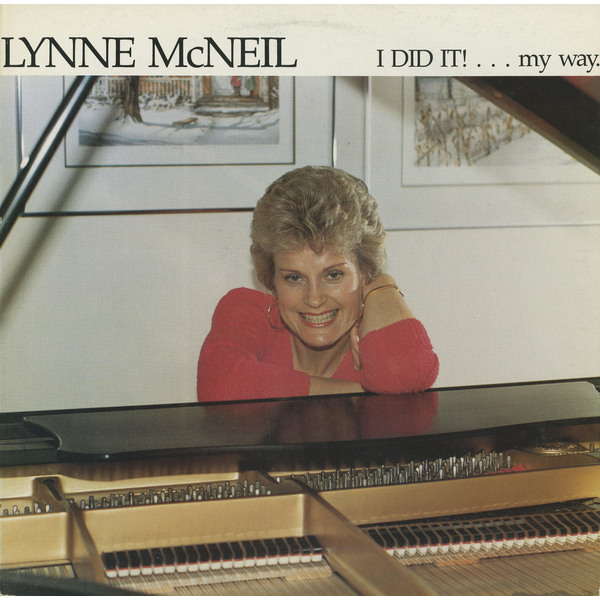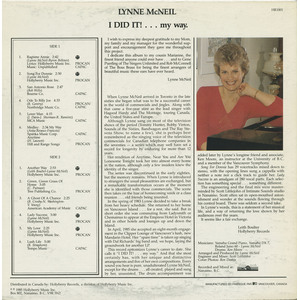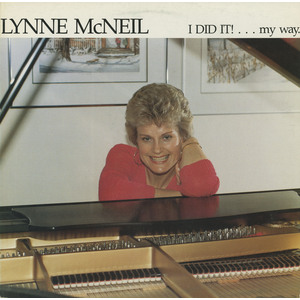Information/Write-up
Lynne McNeil was one of those rare artists whose voice could move seamlessly between the intimacy of jazz phrasing and the clarity of pop melody, a singer whose warmth, discipline, and effortless sense of musicality made her a beloved figure across Canada’s jazz and studio scene. Based for most of her life in Vancouver, she first rose to national prominence as one of the two vocalists in Hagood Hardy & The Montage, sharing the spotlight with Stephanie Taylor. Together they embodied the refined, quietly radiant sound of Canadian soft jazz at the dawn of the 1970s — a sound that merged urban sophistication with emotional understatement.
Her first recording with the group, Hagood Hardy & The Montage (CBC Radio Canada LM-81, 1970), remains one of the rarest and most exquisite records ever pressed under the CBC LM series. Hardy’s crystalline vibraphone glided above supple rhythm work by Gary White and Dave Lewis, while McNeil’s silvery alto intertwined with Taylor’s harmonies on “Scarborough Fair,” “Hideaway,” and “You.” The result was as luminous as it was understated, a Canadian counterpart to the polished light-jazz fusion emerging in Los Angeles — but years ahead of its time. McNeil’s presence gave Hardy’s arrangements a human warmth: elegant, articulate, yet deeply felt.
When Hardy reassembled the group for their 1972 follow-up Montage (GRT 9230-1012), McNeil returned, this time contributing one of her own compositions, “My Love.” Surrounded by guitarist Bill Bridges, bassist Rick Homme, drummer Dave Lewis, and Taylor on co-lead vocals, McNeil helped to expand the group’s reach beyond jazz circles and into the realm of smooth pop sophistication. The album, with its delicate covers of “Baby I’m a Want You,” “How Insensitive,” and “Cast Your Fate to the Wind,” epitomized the polished, cosmopolitan Toronto sound of the early ’70s — a confluence of jazz technique, studio precision, and pop accessibility that Hardy and his collaborators had perfected.
Following her tenure with Hardy, McNeil continued her recording career as a solo artist. In 1974, she released the single “Guilty” b/w “If I Give My Heart to You” on United Artists (UAXW 577X) — a finely crafted pop ballad praised by RPM Weekly for its lush production and smooth vocal delivery. The single marked her debut under her own name and showcased her ability to bridge jazz sophistication with radio-friendly accessibility.
By the mid-1970s, McNeil was also working regularly in Toronto’s studio circuit, contributing background and lead vocals to recording sessions across genres. In 1977, she appeared on Vic Franklyn’s album Friends (Quality 2058-097), recorded at Phase One Studios in Toronto. There she performed alongside Tom Szczesniak, Doug Mallory, Steve Kennedy, Bob Mann, Dennis Pendrith, and Al Wold — a lineup that underscored her standing among Canada’s top session musicians.
Beyond her studio work, McNeil’s live career flourished. She performed with The Johnny Burt Society, recorded for the CBC, and became the featured vocalist with Dal Richards’s orchestra, a role she held for an astonishing 48 years until her retirement. Known for her professionalism and unfailing good humor, she was a fixture of Vancouver’s club and concert scene, her presence as natural onstage as it was behind a microphone in the studio.
McNeil’s studio experience extended well beyond jazz and pop: she recorded commercial jingles, radio spots, and promotional material during the heyday of Canadian advertising’s “golden sound.” One such session, an impromptu visit to Hagood Hardy’s studio, led to her singing a Bell Canada commercial that became a national classic. “It took me five minutes,” she recalled, “and they ran it for fifteen years.” Her rendition of Are You Lonesome Tonight for that campaign would later become a staple of her live sets, which she introduced with characteristic wit: “Ladies and gentlemen, I had a bigger hit on this tune than Elvis.”
In 1973, she appeared on Easy Songs With Guitar (CBC LM-160), recorded in Vancouver — a refined vocal jazz session that revealed her natural phrasing, tonal control, and relaxed sense of mood. The recording captured McNeil’s ability to make even the most straightforward material glow with sophistication and warmth, her voice framed by understated guitar accompaniment and spacious CBC production. More than a decade later, she released I Did It!... My Way (Hollyberry Records HR-1001, 1985), a showcase of both her interpretive depth and instrumental sensitivity. The album paired her smooth vocals and guitar with a collection of jazz and pop standards — from “Ragtime Annie” and “Ode to Billy Joe” to “Lover Man” and “Lush Life” — delivered with an unaffected honesty that made the record feel both timeless and deeply personal.
In later years, McNeil became affectionately known as “The Christmas Lady,” a title that grew out of her first seasonal album — a monumental personal project that took seven years to complete. She recorded five hours every Friday, layering more than a thousand vocal tracks, writing, arranging, and performing every part herself. Her engineer, Ron Czar, began greeting her studio arrivals, sleigh bells in hand, with “Here comes the Christmas Lady,” and the nickname stayed. Among her recordings, her heartfelt version of Have Yourself a Merry Little Christmas was especially dear to her; the song’s composer, Hugh Martin, wrote to tell her he was “glad he’d lived long enough to hear someone do his tune the way I had done it.”
Lynne McNeil’s artistry was defined by her authenticity — a performer equally at home in a jazz club, a broadcast studio, or the quiet intimacy of her own recordings. Her long collaboration with Hagood Hardy & The Montage placed her at the center of a creative moment that blended jazz sophistication with Canadian lyricism, and her later work carried that same grace into every genre she touched. From the luminous harmonies of Montage to her final role as “The Christmas Lady,” McNeil’s voice remains an enduring presence: poised, generous, and full of light — the sound of a lifetime spent making music with heart.
-Robert Williston
Lynne McNeil: Yamaha grand piano, Yamaha DX7, Roland Juno
Ken Moore: drums (Song For Donnie)
Arranged and produced by Lynne McNeil
Engineered by Scott Littlejohn
Recorded and mixed at Nanaimo, British Columbia
Cover photos by Jack Deiter
Front inside photo by Ken Deiter
Liner notes:
I wish to express my deepest gratitude to my Mom, my family and my manager for the wonderful support and encouragement they gave me throughout this project.
I dedicate this album to my cousin Marianne, the finest friend anyone could ever have . . . and to Gene Puerling of The Singers Unlimited and Rob McConnell of The Boss Brass for being the finest arrangers of beautiful music these ears have ever heard.
-Lynne McNeil
When Lynne McNeil arrived in Toronto in the late sixties she began what was to be a successful career in the world of commercials and jingles. Along with that came a five-year stint as the lead singer with Hagood Hardy and The Montage, touring Canada, the United States and Europe.
Although Lynne sang on most of the television shows of the period (Tommy Hunter, Bobby Vinton, Sounds of the Sixties, Bandwagon and The Ray Stevens Show, to name a few), she is perhaps best remembered as the singing voice of the yellow pages commercials for Canadian telephone companies in the seventies — a series which may well have set a record for longevity by enduring for more than 12 years.
Her rendition of Anytime, Near You and Are You Lonesome Tonight took her into almost every home in the nation, although only a few insiders knew the identity of the singer.
In the television medium in the early eighties identity became confused. When Lynne is introduced to strangers the usual pleasantries are exchanged, but a remarkable transformation occurs at the moment she speaks. It is then that they remark where they have heard the voice, be it a wedding, anniversary or a class reunion — or old friends being reunited.
In the spring of 1985 Lynne took a break in her busy schedule to leave the hectic life of the television commercial world for a rest, so to speak. But it didn’t last long — the phone started to ring, and the calls came so often that she found herself on a plane to meet the Empress Hotel in Victoria and on to the Island in which she had found a home and peace of mind.
In April, 1985 she accepted an eight-month engagement in the Clipper Lounge of Vancouver’s lush, new Mandarin Hotel. Her “spare time”, is taken up singing in Westbank and Kelowna and in the interior laying the groundwork for another L.P.
This L.P. epitomizes Lynne’s career to date. She calls it “I DID IT! . . . my way.” And that statement certainly rings with what her accomplishments are. Every arrangement has a “feel” of her own uniqueness. Every sound you hear was arranged, produced and engineered by her, unassisted. The drum accompaniment was added later by Lynne’s longtime friend and associate, Ken Moore, an instructor at the University of B.C. and a member of the Vancouver Symphony.
Song For Donnie has 29 voices tracked down to stereo, with the opening intros sung a cappella with success in an array of 280 vocal parts. Each letter of the name Donnie is a track to guide her. Lady has more strings than most 50-piece string sections. The songwriting all bears a “something different” stamp and is indicative of the final mix produced and mastered by Scott Littlejohn in Seattle.
In Nanaimo, B.C. there was an open-mouthed astonishment by an audience at the sounds flowing through the Clipper Lounge while awaiting the singing artist. In Lynne’s words: “I find the amount of her musical talent sometimes beyond my comprehension. Her mind can hardly grasp the pure emotion she feels when shown by her audience.
It seems like a fair exchange.”
Leith Boulter
Hollyberry Records



No Comments